How to Reinforce an Entry Door and Make it Burglar Proof
Burglar proofing your home is easy. Especially f you have a gazillion dollars to hire security guards, attack dogs and a web of lasers. Ahh, to dream a dream. But, for those of us who actually have a budget there’s a quick solution. And it’ll help you sleep a lot easier at night.
Having a home invasion is nerve wracking to say the least (yes, I’ve experienced this), I understand the fear many homeowners face:
A passionate desire to keep our family safe from all the badness in the world.
Think about this, in many instances the only things stopping a robber from kicking open your front door are 1/2 inch screws, some thin metal (in the form of hinges and strike plates), and at best a wimpy 1 inch piece of wood called your door jamb. Um, I think my 74 year old dad could kick open most people’s doors.
Today I’ll walk you through the installation of EZ Armor (affiliate link). And How to Reinforce an Entry Door and Make it Burglar Proof!
EZ Armor is a door reinforcement kit you can buy for $69. You need limited tools and 15 minutes.
Here’s a supply list to help you get started:
(I’ve included affiliate links for your convenience. I earn a small percentage from a purchase using these links. There is no additional cost to you. You can read more about affiliate links here.)
- Drill or impact driver
- 11/64 inch drill bit (if you choose the drill)
- Phillips head bit for said drill or driver
- Work gloves
- Safety glasses
I promise you’ll boost your home’s safety by leaps and bounds by using EZ Armor. It only take a few minutes to understand why.
The EZ Armor kit I bought came with the following accessories:
- Jamb shield (1)
- Hinge shields (2)
- Door shields (2)
- 2 1/2 inch screws (4)
- 3 1/2 inch screws (17)
Okay, if you’re an excitable DIYer like me you might dive right into the installation. You can watch the video or read the photo tutorial below:
Before you do anything make sure to unpack the hinge shield and place it between your door & jamb.
Do this for both the hinge and door handle side of the door. You’re checking to see if the installation of the shields are feasible. Our door had a good 1/8 gap between the door and jamb. This was plenty of room to accommodate the shields. You could also measure the gap but I think “dry fitting” the shield is a better option.
Step 1-Door Shields
The first step in the EZ Armor instructions is to install the Door Shields by removing the wimpy 1/2 inch screws that hold your latch and deadbolt in place. Slide the Door Shields directly over the deadbolt and latch. Then use the 2 1/2 inch screws provided with the EZ Armor kit to secure the Door Shields.
I my case, there wasn’t enough space between the door and jamb to accommodate both the Door Shields and Jamb Shield. So, I opted to just replace the screws in the locksets with the 2 1/2 inch ones provided with the kit.
Step 2-Hinge Shields
Your door is probably already open but if not go ahead and do so. If you have three hinges we’ll be working with the middle one first. If you have two hinges we’ll be working on the top one first.
Spot the two screws that are closest to the door stop (and weather stripping if you have some.) Remove them with your drill or driver.
Drill a 3 inch pilot hole with an 11/64 inch drill bit in the holes where the hinge screws were. If you have an impact driver skip the drilling and drive a 3 1/2 screw into one of the holes. Make sure the screw head is flush with the hinge.
Place a Hinge Shield over the hinge so that the hole with the removed screw lines up with one of the holes near the center of the Hinge Shield. Drive a second 3 1/2 inch screw through the hole on the Hinge Shield until its head is flush against the Hinge Shield body.
Each Hinge Shield has a top and bottom hole for two additional 3 1/2 inch screws. Pre-drill these holes with an 11/64 inch drill bit then drive in the screws. Again, make sure their heads are flush with the Hinge Shield.
Repeat these exact steps for the bottom hinge with the second Hinge Shield.
At this point, close your door to see if it works correctly. It should but if you run into problems the first thing to do is check that all the screw heads are flush with the Hinge Shields.
Step 3-Jamb Shield
There are several knockout holes in the Jamb Shield. This allows you to line up the Jamb Shield with the strike plate and deadbolt holes in your jamb. You won’t have to remove the existing strike plates if they sit flush with your jamb. If they sit on top of the jamb you may have to remove them because they will cause the Jamb Shield to be raised.
You can use your thumb or finger to twist off the knockouts.
Push the long leg of the Jamb Shield behind your door’s weather stripping. The curved edge should point toward the interior of your house.
It’s SUPER IMPORTANT that the holes in the jamb shield line up with those for the deadbolt and latch. Otherwise, your door won’t lock properly and you’ll be cursing me for ever introducing you to this project.
Once everything is aligned, hold the Jamb Shield in place and use a pencil to mark the three screw hole positions in the center.
Again, either pre-drill with an 11/64 inch drill bit or use your impact driver to drive in three 3 1/2 inch screws. If you pre-drill, make a hole that’s about 3 inches long so that the 3 1/2 inch screws will easily embed into the jamb and rough framing.
Before you do any more hole drilling DOUBLE CHECK the Jamb Shield’s holes are lined up with the old strike plates. I can’t emphasize this enough.
If everything looks good, use 4 more 3 1/2 inch screws to attach the Jamb Shield at the 4 screw hole positions (there are two at the bottom and two at the top).
Make sure the screw heads are flush with the Shield. Close your door and see if the locks function correctly. If you get a little bit of rubbing from the deadbolt or door handle striker you can use a small file to remove some of the Jamb Shield’s holes.
You should be able to sleep like a bear now that you have a Reinforced Entry Door that is Burglar Proof. The 3 1/2 inch long screws you used secure the Shields to the rough framing, which is WAY better than 1/2 inch screws that are only attached to the rinky dink jamb. Plus, if any hoodlum tries to kick open your door the Shields will distribute the force a lot better than your hinges or 2 1/4 inch strike plates.
Do you use something else to burglar-proof your house? Let me know in the comment section.
Did you find this helpful? If so, you’ll definitely appreciate how to burglar proof your glass doors and windows now!
And be sure to read 12 Ways to Burglar Proof Your Home!

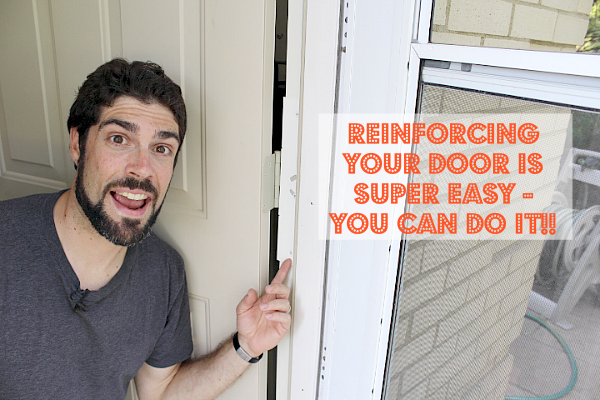
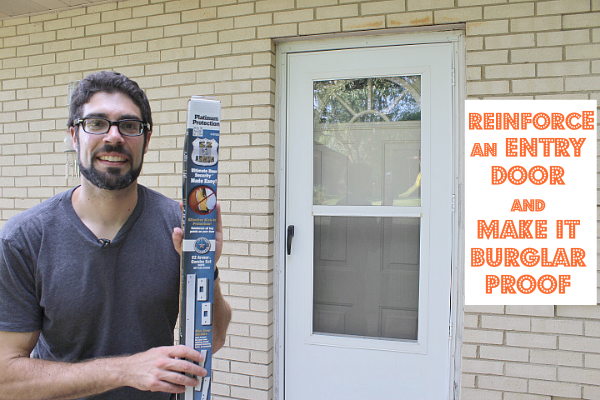
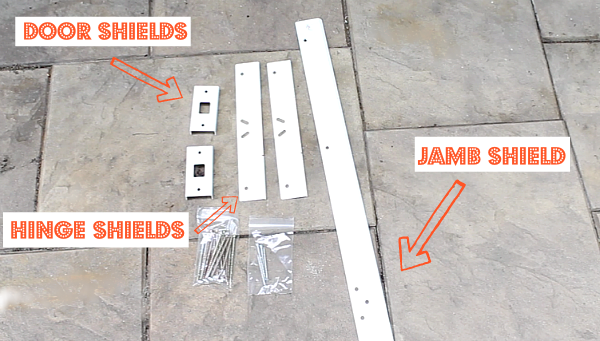
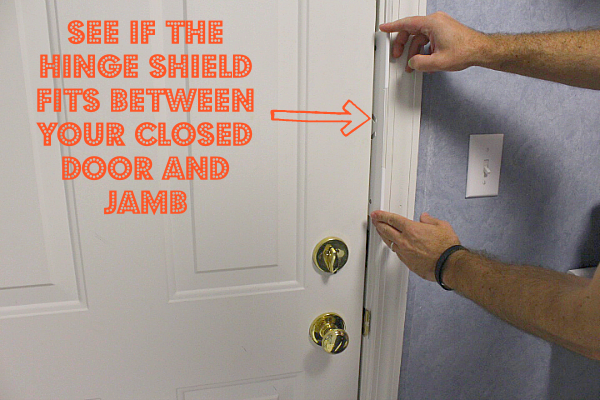

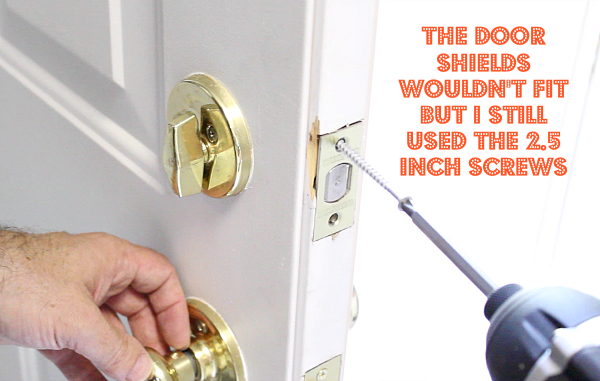
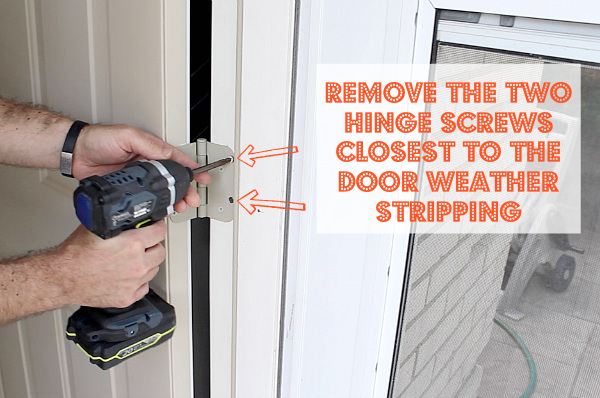
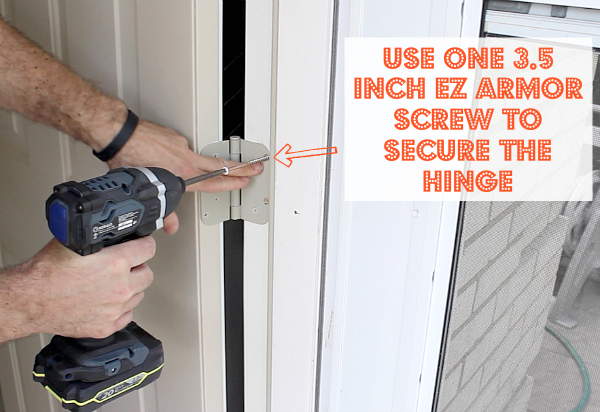
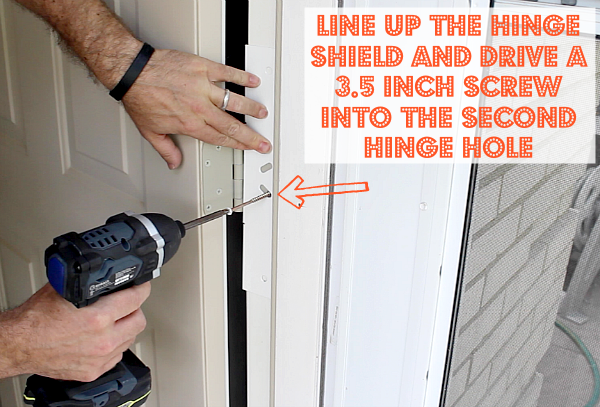

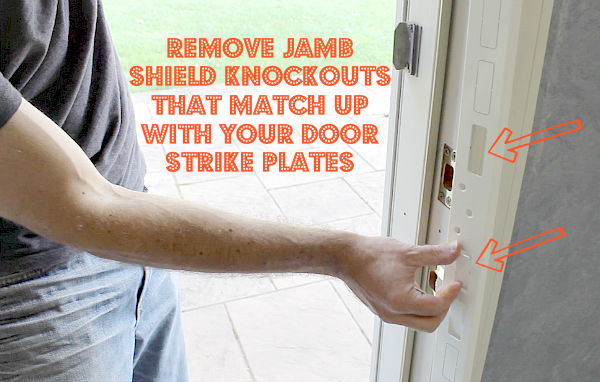
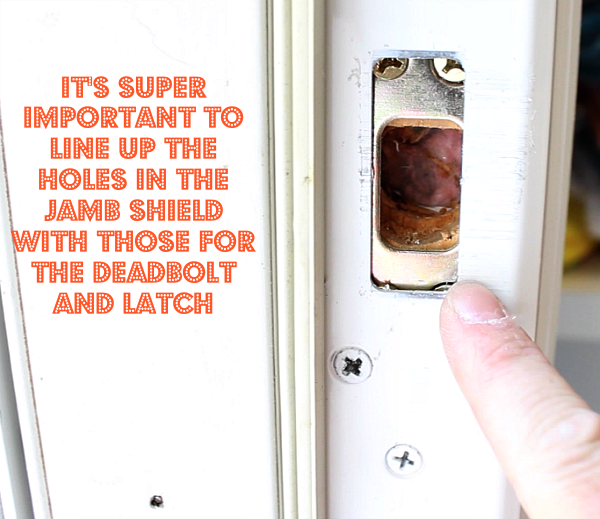
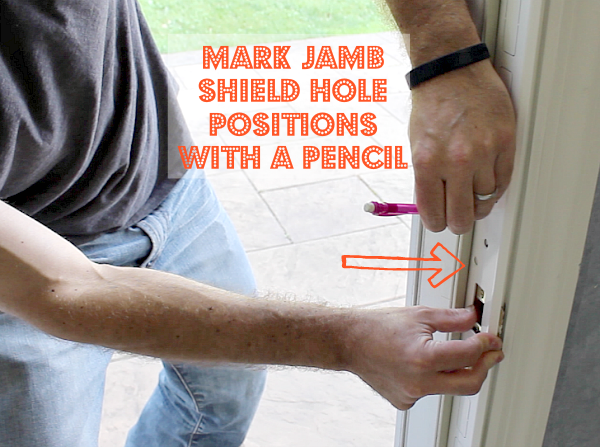

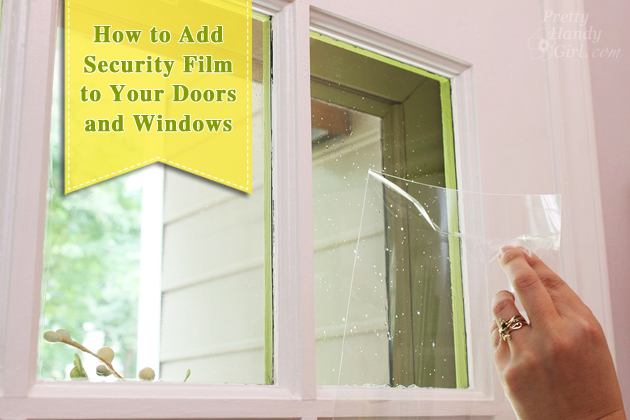
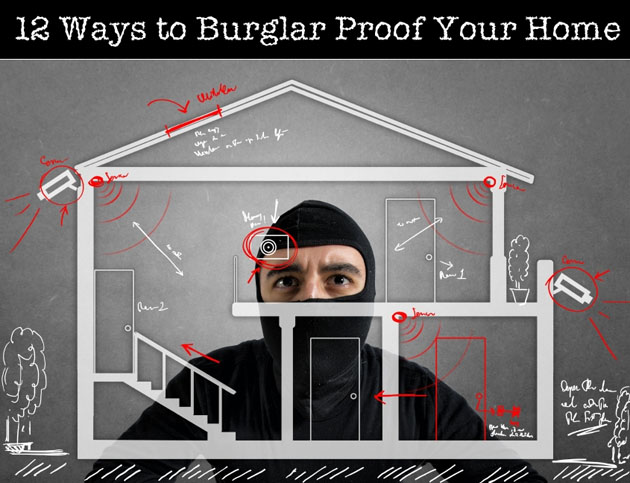



Thieves can remove PLENTY though a window! You think they are there to take your washer and dryer? NOT.
They will take, cash, coins, artwork, tools, guns, computers, small electronics, your kitchen mixer etc etc. ALL things that can be easily passed through a broken window.
#1 rule, DON’T have windows on entry/exit doors.
Great, you reinforced the door. The thief will know this in 2 kick attempts and then move onto the window on the door or one of the house windows.
If the road is block with construction barricades, do you give up and drive back home? NO. You find another way around.
Thanks for your information Dale. We actually followed up with some tips for burglar proofing glass! https://prettyhandygirl.com/add-security-film-glass-door-deter-burglars/
I bought 2 heavy high security door locks to back up deadbolts. These small packages tell you nothing except where to put the screws, if you’re lucky.
Every minute a thief is on your property attempting to break in, his/her chances of getting caught are MUCH higher. If they can’t easily get in they usually will give up and move on to somewhere else that is easier. Don’t make it easy for thieves. Security cameras these days are cheap too and a GREAT deterrent. Anything that increases their chance of getting caught is going to make them look for easier prey. Remember one thing too. Basic run of the mill thieves are lazy. If they weren’t, they’d have a job. Unless you got something really worth stealing, they’ll look elsewhere where the risk of getting caught is lower.
whats even better remove the door trim at the jamb shield, install a thin piece of steel plating between the door frame and the 2×4 then, counter sink two holes in the door jamb and install lag screws 4″ long. before installing the steel plate mark where the dead bolt throw will meet the steel plate. then cut a hole in the steel plate. then fill the door jamb where you drilled the holes and paint the door jamb. also secure your hinges.
and if you have a window near the door, or better yet all windows on ground level use security glass, or that sticky stuff that you put on inside of the window to prevent breaking.